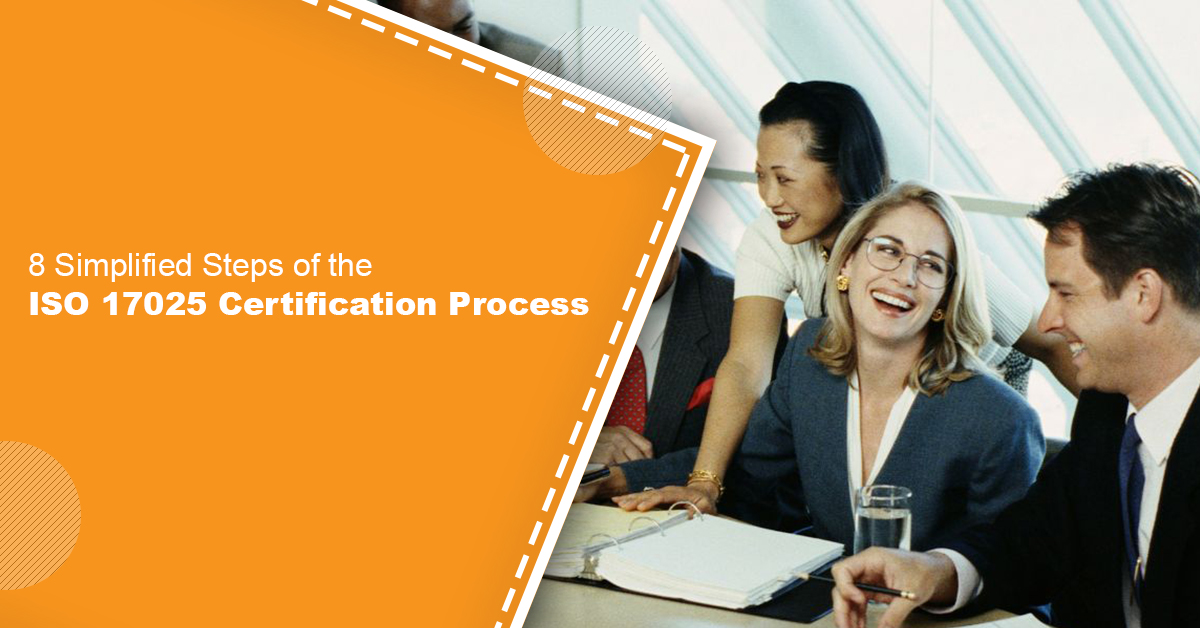8 Simplified Steps of the ISO 17025 Certification Process
Testing and calibration bodies have distinct functions that are crucial for organizations or businesses. Their functions involve testing, sampling, and evaluation of products to ensure that they conform to the necessary criteria or regulations. The laboratories for testing can be either privately-owned or owned by the government.
ISO 17025 is the standalone certification standard for the quality management system (QMS) of testing and calibration laboratories. Achieving it will help your laboratory earn recognition and ensure consistent processes to produce accurate results. In other words, getting this ISO accreditation will demonstrate your laboratory’s technical ability to provide more precise and reliable data after testing.
To know what steps are involved in the ISO 17025 certification process, read more in this blog. The certification is applicable to both standalone laboratories as well as laboratories that operate as a part of industries or organizations.
If you want to put your laboratory at the forefront of the testing and calibration industry, then getting the certification is the most appropriate step! Learn here how you can earn the certification for your lab.
8 Brief Steps that Outline the ISO 17025 Certification Process
- Awareness and Understanding of the Standard
To get the certification, it is imperative to acquire knowledge about the terminologies and requirements of the ISO 17025 standard. The employees or staff of your laboratory will be responsible for creating the QMS based on the standard. Thus, you should hold training sessions once you have decided to apply for the certification. It will make staff at all levels prepared for the QMS and subsequently, aware of its new practices.
- Formulation of Quality Policy
To build a concrete QMS of your laboratory, you need to formulate a definite quality policy. The policy should envelop the core objectives of the QMS as per the standard’s requirements. Also, it should be the foundation stone of your QMS. So, keep in mind to incorporate the practices necessary for ensuring quality results. For instance, put aspects of continual improvement, employee engagement, and management reviews in the policy.
To develop a policy that perfectly aligns with the context of your laboratory, you can use prominent analytical tools like the SMART model (Specific, Measurable, Achievable, Relevant and Time-bound).
- Perform a Formal Gap Analysis
This is an elementary step that will help to figure out the current position of your lab’s operations as well as QMS against the standard. A detailed gap analysis will let you know which ISO requirements are not met. So, you can understand the degree of compliance of your laboratory. Next, you will be able to determine the improvements needed in your existing operations and QMS to close the gaps and achieve compliance.
- Prepare the Documentation
Maintaining up-to-date documents of your QMS and operations is a crucial requirement for achieving the standard. Thus, prepare all the documents precisely as they will be also reviewed by the external auditors of the certification body. Key documents that you should prepare are quality manual, functional procedures, system procedures, system formats, test procedures, work instructions, and validation methods.
- Implement the QMS
With the help of the documented procedures and work instructions, put the QMS into practice. You need to designate responsibilities to the staff and get resource support (equipment, infrastructure facilities, etc.) from the management for the implementation procedure.
To undergo the implementation procedure smoothly, prepare a comprehensive checklist of the steps. Following the checklist will also prevent you from skipping any criteria or procedural requirements in the QMS. Thus, it will ensure a higher compliance level of the QMS once it is implemented.
- Perform an Internal Audit
This is a pre-assessment of your operations and QMS to check whether they agree to the standard. This must be done by some expert assessors from your team or an external agency who have an in-depth understanding of the ISO laboratory standard. They will perform the assessment and highlight any areas of non-conformities in the audit report. It will help you to make changes or apply corrective measures to eliminate the non-conformities and make your lab eligible for ISO accreditation.
- Apply for the Certification
At this step, you need to look for registered certification bodies and select a suitable one according to your preferences. You should file an application and they will provide a price quote and estimated time for conducting the certification assessment. If you agree with them, you are good to go!
- Get the Certification
The chosen certification body will conduct a thorough on-site assessment of your operations, QMS, documentation, and employee responsibilities. They will interview the employees, witness selected test procedures, or examine certain calibration equipment. On completion of the assessment, they will affirm the compliance of your laboratory with the ISO standard if they do not find any non-conformity. Subsequently, they will award the certification.
If they find any nonconformity or discrepancies, they will alert you. Those must be corrected within a given timeframe to get the certification.
Key Takeaway
Achieving the ISO 17025 standard will take your testing and calibration laboratory to the next level. By demonstrating its excellence in producing accurate results, the accreditation will provide a competitive edge to your laboratory. It will widen the acceptance of your test reports across the world and so you will be able to acquire more contracts. Therefore, you get opportunities to expand and grow your revenues.
Testing and calibration laboratories around the world need to follow this ISO 17025 certification process to achieve the certification faster and without fail. These steps are advocated and followed by the premier ISO consulting agencies. Thus, you should seek support from a trusted consulting services provider for your journey.
If you need assistance in the ISO accreditation procedure of your laboratory, Compliancehelp Consulting LLC is here to help you. We have a team of professional quality assurance consultants who can take you through these steps and thereby, get your lab certified smoothly. Feel free to contact us!

